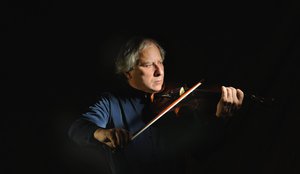Schönberg: Six Little Piano Pieces, Op. 19
Messiaen: Le Merle noir
Brahms: Clarinet Quintet in B minor, Op. 115
Messiaen: Quatuor pour la fin du temps - eighth movement: Louange à l'Immortalité de Jésus
Schönberg: Verklärte Nacht, Op. 4
András Keller, Zsófia Környei violin, Gábor Homoki, László Móré viola, Dóra Kokas, Tamás Migróczi, Péter Somodari cello, Orsolya Kaczander flute, Csaba Klenyán clarinet, Gábor Csalog piano
We're broadcasting this performance live! CLICK HERE TO WATCH LIVESTREAM

Although an initial hearing seems to reveal no similarity at all between the music of Brahms and Schönberg, who both composed in Vienna, but in the late 19th century and first half of the 20th century, respectively, the latter considered his older colleague to be one of his most important musical predecessors. And on top of that, both of them did quite important creative work in the area of chamber music.
Schönberg composed his set Six Little Piano Pieces ten years before developing the dodecaphonic method of composition. He wrote the first five movements over the course of a single day in February 1911. The sixth one came somewhat later. Each of them is succinct to the point of aphorism. At the same time, the work is rhapsodically varied and impactful, inviting listeners on a unique journey.
Schönberg's string sextet Verklärte Nacht ('Transfigured Night'), the fourth opus in his catalogue, dates from earlier, from 1899, and remains a repertoire piece to this day. As the composer György Selmeczi once wrote, 'It is always a serious challenge for string ensembles to perform.' In his view, the composition is pervaded throughout by a personal tone and sense of passion, with nearly unstructured segments alternating with complex and crowded formal parts.'
A contemporary critic had the following praise for the Brahms clarinet quintet: 'There is no doubt that this chamber piece will prove to be the most significant new work, and perhaps the master's best-known composition. The adagio is the loveliest of chamber music movements, the likes of which were last written only by Beethoven.' It has since been proved that, even regardless of Beethoven, Brahms's work is one of the greatest masterpieces of any music composed for both chamber groups and the clarinet.
The music of the other composer on the concert's programme, Olivier Messiaen, is defined by two very powerful motifs. The first is the composer's deeply religious feeling. His works are often woven thematically around theological questions, as is most wonderfully exemplified by the featured movement Louange à l'Immortalité de Jésus ('Praise to the immortality of Jesus') from the chamber work Quatuor pour la fin du temps ('Quartet for the End of Time').
The other important focus is on ornithology: 'Listen to the birds,' Messiaen was instructed by his teacher, Paul Dukas, 'for they are great masters!' And as we all know, the student took this advice to heart. Attesting to this fact, along with so many other compositions of his, is Le Merle noir ('The Blackbird'), in which we'll hear the amazing accuracy with which the composer set down the most varied possible sounding assortment of birdsongs
